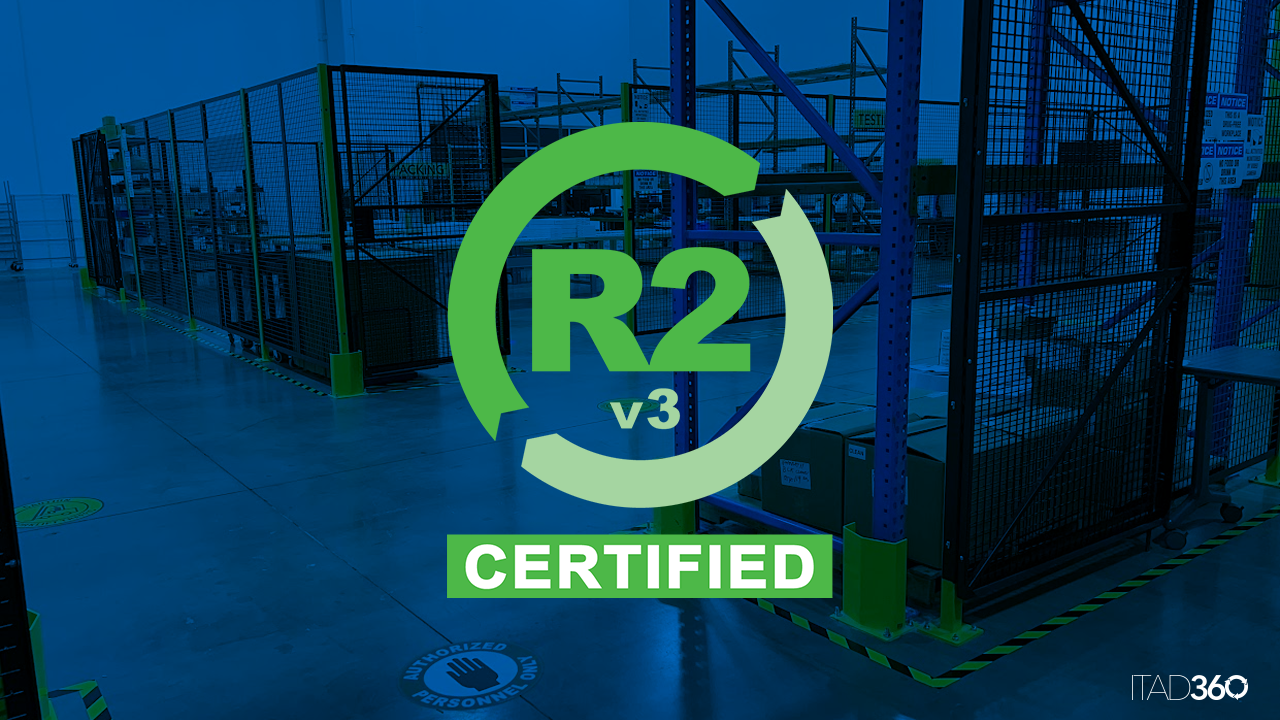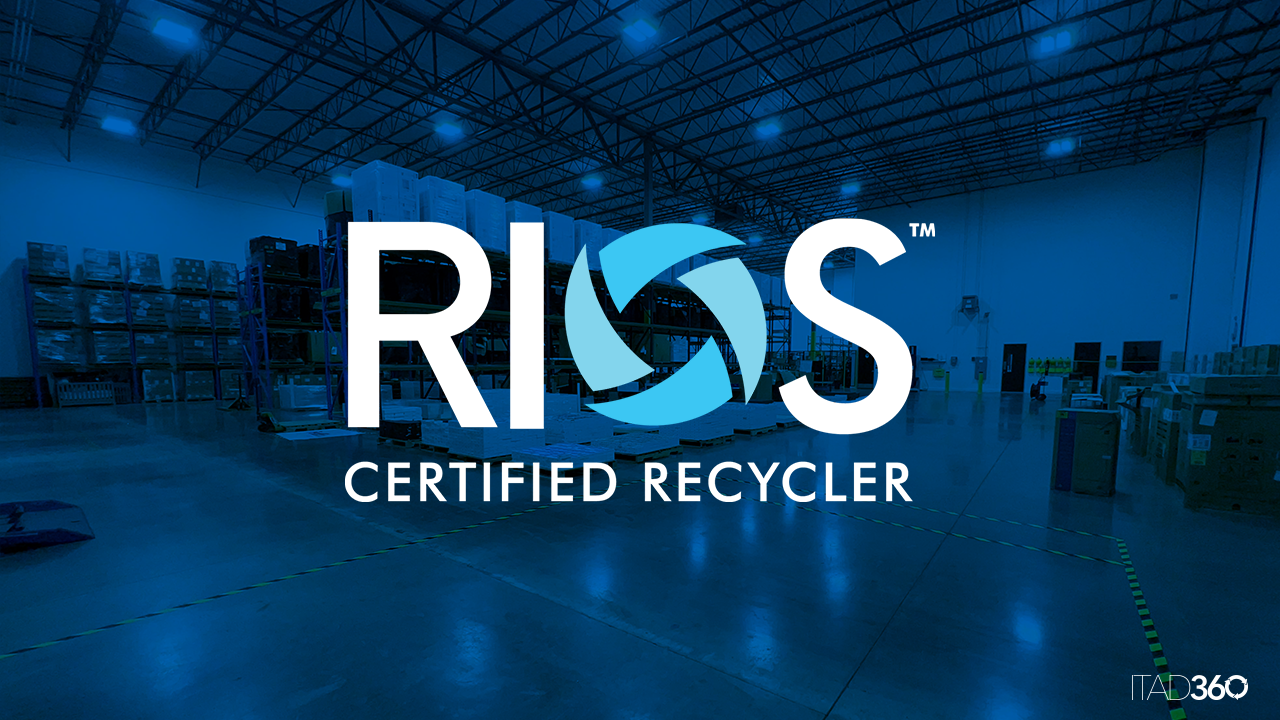Sustainability
Partnerships are essential for fostering a circular economy. ITAD360 collaborates with companies to help them achieve their sustainability goals and drive their ESG initiatives forward.

R2v3
R2v3, also known as the Responsible Recycling Practices Standard (R2 Standard), is a globally recognized certification program for electronics recycling and refurbishment operations. It establishes a set of requirements and best practices to promote responsible management of electronic waste (e-waste) and to ensure the protection of the environment, human health, and data security.
Here are key aspects and principles associated with the R2 Standard:
- Environmental Responsibility: The R2 Standard emphasizes environmental stewardship in electronics recycling. It requires certified facilities to implement practices that minimize the negative impact of e-waste on the environment. This includes measures to prevent pollution, manage hazardous materials, and promote recycling and resource recovery.
- Data Security: Data security is a critical component of the R2 Standard. Certified facilities must implement robust data destruction processes to ensure that sensitive and confidential data is properly handled and protected during the recycling or refurbishment of electronic devices. This involves secure data erasure or physical destruction of storage media.

- Health and Safety: R2v3 certified facilities prioritize the health and safety of their workers. They are required to maintain safe working conditions, provide appropriate training, and adhere to applicable laws and regulations to safeguard the well-being of employees and contractors.
- Focus on Reuse and Recycling: The R2 Standard encourages the reuse and recycling of electronic devices. Certified facilities are expected to assess devices for their potential for reuse and implement refurbishment and repair processes when feasible. If reuse is not possible, they ensure proper recycling of components and materials, maximizing resource recovery.
- Responsible Management of Downstream Partners: R2v3 certified facilities must exercise due diligence in selecting and managing downstream vendors and recycling partners. They are responsible for ensuring that all downstream vendors adhere to the same responsible recycling practices outlined in the R2 Standard. This ensures the proper handling of e-waste throughout the recycling chain.
- Legal Compliance: R2 certification requires facilities to comply with all applicable laws, regulations, and permits related to e-waste management. Certified facilities must stay up to date with evolving regulations and maintain documentation demonstrating compliance.
- Continuous Improvement: R2 promotes a culture of continuous improvement. Certified facilities are expected to set objectives, measure their performance, track key performance indicators, and implement corrective actions to address non-conformities and enhance their operations over time.
R2 certification provides assurance to customers, stakeholders, and regulatory bodies that a recycling facility meets rigorous standards for responsible e-waste management. It demonstrates the facility’s commitment to environmental sustainability, worker safety, data security, and compliance with applicable regulations.
RIOS
RIOS (Recycling Industry Operating Standard) is a comprehensive management system standard specifically designed for the recycling industry. It provides a framework for recyclers to establish and maintain an effective management system that integrates environmental, health, safety, and quality practices.
Key features and components of RIOS include:
- Management System: RIOS focuses on implementing a robust management system that drives continuous improvement and compliance. It requires recyclers to establish policies, procedures, and controls to manage various aspects of their operations.
- Environmental Performance: RIOS emphasizes environmental stewardship by requiring recyclers to identify and manage their environmental impacts. It addresses issues such as air emissions, water management, waste handling and disposal, energy efficiency, and resource conservation.

- Health and Safety: RIOS places a strong emphasis on ensuring the health and safety of employees, contractors, and visitors within recycling facilities. It requires the implementation of appropriate safety protocols, risk assessments, training programs, and the provision of personal protective equipment.
- Legal Compliance: RIOS mandates compliance with applicable laws, regulations, and permits. Recyclers are required to identify and understand the legal requirements that apply to their operations and establish mechanisms to monitor and ensure compliance.
- Quality Management: RIOS integrates quality management principles into recycling operations. It encourages recyclers to establish quality control measures, implement process improvements, and focus on customer satisfaction.
- Continuous Improvement: RIOS promotes a culture of continuous improvement. Recyclers are expected to set objectives, measure performance, track key performance indicators, and implement corrective actions to address non-conformities and improve their operations over time.
- Documentation and Auditing: RIOS requires recyclers to document their management system, procedures, and practices. It also mandates regular internal audits and periodic third-party audits to verify compliance with the RIOS standard.
By implementing RIOS, recycling facilities can demonstrate their commitment to responsible and sustainable practices in the recycling industry. It helps improve operational efficiency, reduces risks, enhances environmental performance, and ensures compliance with legal requirements. RIOS certification provides credibility and assurance to customers, stakeholders, and regulatory bodies that a recycling facility is operating in a responsible and transparent manner.
What is Circularity?
The concept of circularity, often referred to as the circular economy, presents a compelling solution to the challenges of waste and resource depletion. By reintegrating electronic devices at their end of life into the supply chain, it aims to extend their usability, reducing the urgency for landfill disposal and promoting sustainable resource utilization.
How We Got Here
The transition away from linear economies is compelled by the escalating correlation between consumer demand and waste production. The rapid growth of e-waste, currently the world’s fastest-growing waste stream, poses severe threats to our planet’s overall well-being.From contaminating soil and water to detrimental impacts on human health, the complexity of issues associated with this problem expands as it worsens.Companies face significant fines each year due to data breaches that occur after data-bearing devices leave their inventory. To prevent digital or physical data theft, technology must be securely wiped, regardless of its destination after use, whether for storage, resale, waste disposal, or transfer to another employee.Constant consumer demand for technology drives a continuous stream of new production and manufacturing.

To keep pace, devices are not always designed for longevity or to accommodate emerging technological advancements. This relentless race results in escalating waste generation and the depletion of non-renewable resources for development.Surprisingly, landfills house some of the world’s richest deposits of precious resources, as e-waste holds an abundant inventory of valuable materials ideally suited for recycling and repurposing, if only they were not confined to landfills.
Our services facilitate the adoption of a circular economy model for our customers

ITAD
ITAD services ensure the safeguarding of your company’s end-of-use IT assets through secure and environmentally compliant practices.

ASSET MANAGEMENT
Entrust your IT device fleet to a global network of skilled experts, who will take care of every aspect from acquisition to disposition.

REVERSE LOGISTICS
ITAD360 places significant importance on its reverse logistics services, aiming to optimize the recovery of value from technology assets

3PL
Lorem ipsum dolor sit amet, consectetur adipiscing elit, sed do eiusmod tempor incididunt ut labore et dolore magna aliqua.
